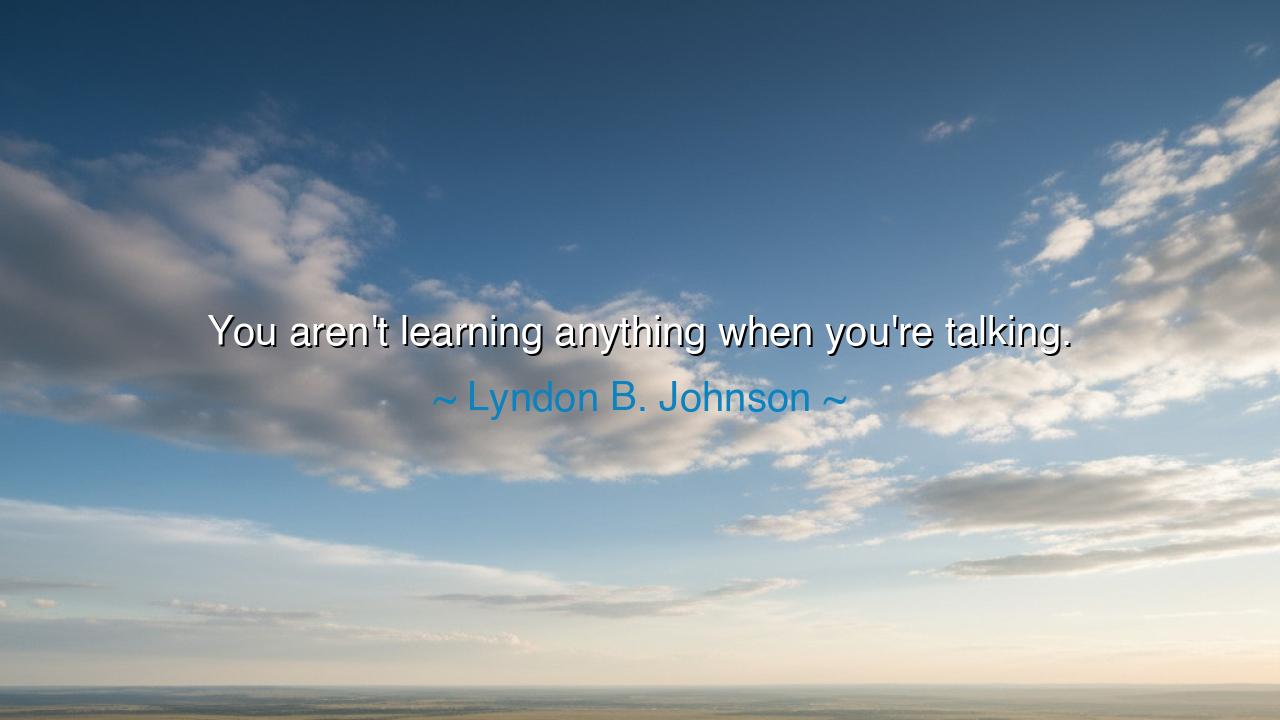
You aren't learning anything when you're talking.






“You aren’t learning anything when you’re talking.” — Thus declared Lyndon B. Johnson, a man who had seen the fires of politics and the silence of wisdom. These words, though simple, are a blade that cuts through the arrogance of the human tongue. For speech is the tool of the ego, but listening is the gateway of the soul. When we speak, we repeat what we already know; when we listen, we receive what we do not. In this truth lies a timeless law: the wise are not those who speak the most, but those who listen the deepest.
In the temples of the ancients, silence was not emptiness — it was presence. The masters of the East taught that one must empty the cup before it can be filled. To speak constantly is to keep the cup overflowing, spilling wisdom before it can be received. The quiet mind is the fertile soil where new understanding takes root. The talkative mind, forever echoing its own voice, leaves no space for the seeds of insight. Thus, Johnson’s words remind us that learning begins where talking ends.
There is power in silence, but it is not the silence of fear — it is the silence of listening. Consider the story of Abraham Lincoln, the great American leader who once said, “I don’t like that man. I must get to know him better.” Lincoln was known for his pauses, for listening longer than he spoke. In those pauses, he gathered the hearts of men, reading what was unspoken, discerning motives beneath words. It was through this listening wisdom that he led a nation through its darkest hour. His greatness was not in his speeches alone, but in the silence that shaped them.
To listen is an act of humility — the surrender of the self to something greater. It requires patience, discipline, and a willingness to admit that one does not yet know. In a world that worships noise, to listen is an act of rebellion. The fool interrupts to prove his worth; the wise man pauses to expand his understanding. Every great thinker, from Confucius to Socrates, spoke less than they pondered. They listened — to nature, to others, to the quiet voice within. That is how wisdom was born in their hearts.
When Johnson uttered this truth, he was not merely giving advice for polite conversation. He was teaching a law of leadership and learning. As a statesman, he knew that to rule others one must first listen to them. He had seen men of power destroy themselves through the blindness of their own words — deafened by their pride, unmoved by others’ truths. In the chamber of discourse, he understood that silence is not weakness, but strength in waiting. For only the listener can truly see the whole.
Learning, then, is not a loud process. It is a quiet transformation. The ear, not the tongue, is the organ of wisdom. To listen deeply is to honor the world — to admit that life itself has something to teach you. The wind, the voices of elders, the cries of the poor, the whispers of your own heart — all speak truths that no amount of talking can uncover. The universe hides its lessons in stillness; those who cannot be still will never hear them.
So, my child, remember this: when you speak, your knowledge stands still; when you listen, it grows. Learn to pause before replying. Let others’ words pass through your mind as a stream through clear water — undisturbed, reflective, deep. Seek out silence as you would seek out a teacher. In conversation, strive not to dominate, but to understand. Let your words be few and filled with meaning, shaped by what you have heard.
For in the end, wisdom is born not from the mouth, but from the ear. The greatest voices in history first learned to be still. Be therefore among the listeners, the seekers, the quiet ones who watch and learn. Speak when your heart is full, but listen when the world is speaking — for that is when the soul awakens, and true learning begins.






AAdministratorAdministrator
Welcome, honored guests. Please leave a comment, we will respond soon